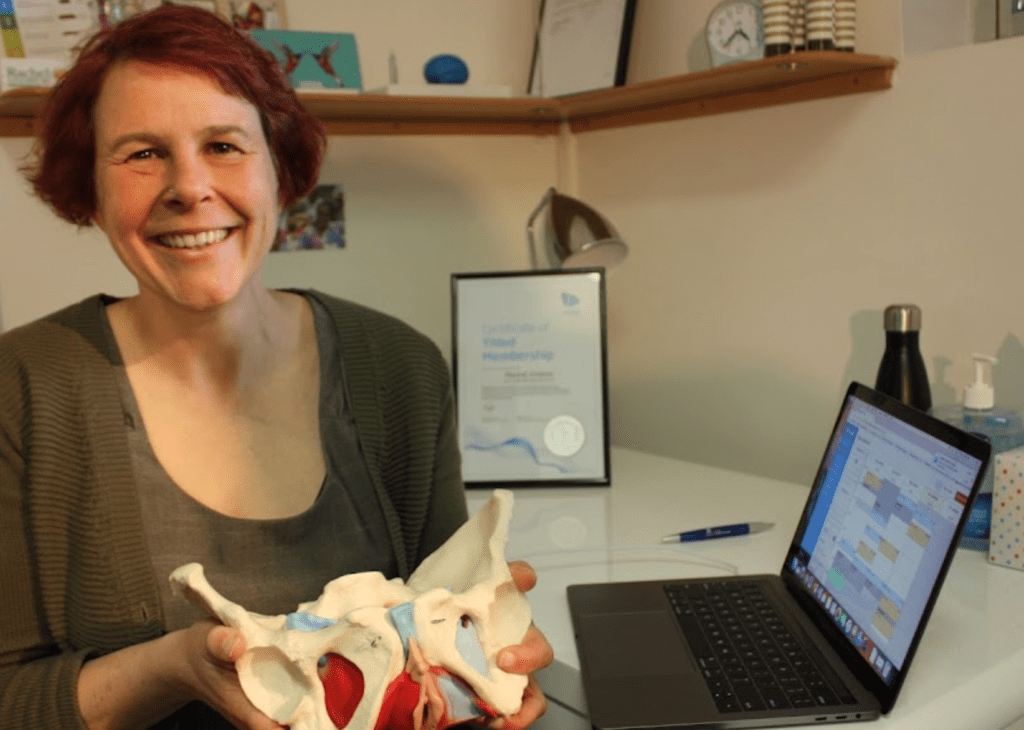I’ll never forget the time a male GP told me to “squeeze like you’re holding in a tampon” to help explain how to do the Kegels that would support me during my pregnancy at the time.
It was my first foray into learning more about the pelvic floor, a part of my own anatomy supporting the pelvic organs that would ultimately help me support and deliver the baby.
I’ll also not forget the first time I learned about pelvic floor physio, about a year later and after sustaining an injury during childbirth.
These physios can measure the extent of pelvic floor dysfunction or damage alongside improvements the patient is making. Rather than just telling patients what exercises to do, they can actually support them in learning how to do these movements, measuring their success and making additional recommendations along the way.
These physios also serve a vital role in getting women back into exercise.
And yet, we don’t always know much about them until we really, really need them (and happen to get the right GP or gynecologist who knows to refer one).
In other parts of the world, pelvic rehabilitation is par for the course of the childbirth experience. In France, women are automatically prescribed ten rehabilitation visits post childbirth that they can choose to take up or not, free of charge. They’re also afforded ten sessions to support the rehabilitation of their abdominal muscles.
And if these sessions aren’t enough? They can return to their doctor to get a referral for ten more.
The result, according to physiotherapists in Paris, is that women and girls understand and discuss their pelvic floor. They have a greater awareness of the pain to watch out for (particularly pain that may be associated with endometriosis or something else) as well. And, overall, France experiences greater public health benefits.
On the latest installment of The Women’s Health Project podcast supported by Organon, we delve into this area of anatomy to learn more about its essential role in supporting overall wellbeing.
Pelvic physio is growing in Australia but we have a lot of catching up to to do. When Heba Shaheed, from the Sydney-based The Pelvic Expert, was studying physio at university, she recalls learning about an hour on women’s health in the fourth year.
It wasn’t until Heba undertook a post-graduate-style course that she ventured into this area, and realised that so many of the health issues she was experiencing were linked to her pelvic floor. She says that incontinence is an issue for many of her patients, but actually, a lot of her work is to support women with pelvic pain, sexual pain, period pain, birth injuries and preparation for pregnancy and childbirth.
She wants greater knowledge and awareness on the pelvic floor shared with women and girls, something she’s actively contributing to through her Instagram presence.
“How can we empower women to even know where to go to heal their bodies if they don’t have that knowledge about this area of health in the first place?” she says on the podcast. “And if when they go to GPs, that the GPs don’t know about pelvic floor physios being an option?”

If you sustain a knee, shoulder or ankle injury, a physio is usually the first option, Heba says. But the same level of consideration is not always provided for pelvic floor-related pain and dysfunction.
That means those experiencing symptoms can go on without realising what options are available.
“There are so many consequences on a personal level, but also on a relationship level,” she says.
“Women may avoid returning to exercise and sport. They may feel disempowered. Afraid, scared to try something new when a doctor is saying ‘you can’t do this and that’. And mental health can definitely be affected too
“That feeling that ‘now I can’t run’, or ‘I can’t go to work without feeling like I need to go to the bathroom’ or that ‘I’m scared I’m going to wet my pants,’ for example.
“Or ‘I’ve got this lower back pain that just doesn’t go away and I can’t sit for more than 30 minutes. I can’t stand and run this meeting I have’. Whatever it might be. It has an impact on everything and it can cause a domino effect.”
Heba goes on to highlight the impact on work, relationships, sex life, exercise life and overall wellbeing for countless women.
Another pelvic physio, Rachel Andrew, agrees. Based in Hobart and running a dedicated pelvic physio practice, she tells the podcast how during her general physio training they didn’t receive the detail needed to understand the anatomy of the pelvic floor and how integral it is to core, abdominal muscles, breathing and the back.
“It’s crazy we’re not taught more about this,” she says.
“Women have no idea about their own bodies, and men have no idea about women’s bodies.”

Like Heba, Rachel believes promoting awareness among girls in school would be beneficial so that they can understand more about their vaginas, and also the deep bowel of muscle that helps support their organs.
It’s been ten years since Heba started as a pelvic floor physio. Back then, the field was even more niche than it is now. She says with millions of women in Australia, this should be a much bigger area of health than it currently is.
She would like to see more options for women to see a pelvic floor physio, given the wide range of different treatment needs.
“I would like women to have the opportunity to see a pelvic floor physio, at least once. You can then make a diagnosis and give her a specific program. I would much rather that people can consult with a pelvic floor physio to get an individual approach before exercises are given.
“Education about the importance of getting your pelvic floor checked, is so important. Just like you go for a postpartum check with your GP, or ho we get our breasts checked. I would love it to be mainstream to have your pelvic floor checked.
Rachel agrees. She wants to see Australia follow the French on making pelvic physio and rehabilitation (especially post childbirth) part of the mainstream. But she’s pleased to see more women taking their healthcare into their own hands and researching and learning more, particularly when it comes to sexual health.
We talk about all this and so much more on the latest episode of The Women’s Health Project. Listen now or subscribe to the full series on your favourite podcasts app.
This is the sixth episode of the Women’s Health Project podcast series is out today.
This podcast is independently created by Women’s Agenda and proudly sponsored by Organon, a pharmaceutical company dedicated to a better and healthier every day for every woman. Women’s Agenda is published by Agenda Media, a 100% female-owned and run media company.


